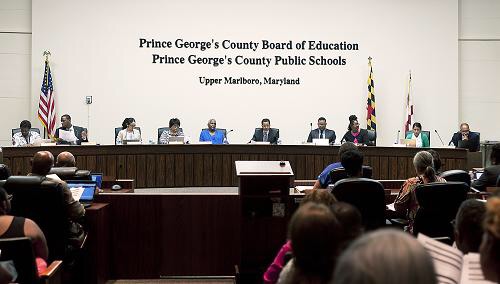 CLINTON – While Montgomery County continues to squabble over the removal of a statue honoring those who died serving the Confederate army in the Civil War, Prince George’s County officials and residents have decided they want symbols of history—such as the Surratt House here—to remain intact.
CLINTON – While Montgomery County continues to squabble over the removal of a statue honoring those who died serving the Confederate army in the Civil War, Prince George’s County officials and residents have decided they want symbols of history—such as the Surratt House here—to remain intact.
The Surratt House, which is open to the public for tours—was erected in 1852 as part of a middle-class farm for Confederate sympathizers John and Mary Surratt, and served as a hiding place for John Wilkes Booth, the Confederate supporter who assassinated President Abraham Lincoln. Booth died there after the farm was set on fire.
Since the removal of the Confederate flag in South Carolina, Baker said, more Americans have begun to express their concerns about symbols of hatred that occupy public places. Should anything of that nature come up in Prince George’s County, he said, the county will address the matter seriously.
“We have always touted that diversity is our strength here in Prince George’s County, so symbols and monuments that glorify heroes of a very divisive time go against the grain of our quest towards equality for all of our citizens,” Baker said. “We will address all requests for the renaming and removal of these symbols seriously, respecting the diversity of our citizens.”
The county must ensure that it “does not promote hatred and intolerance in any form or fashion,” Baker said. Currently, he said, the administration is unaware of any requests or proposed policies to rename or remove Confederate related history from county-controlled sites or monuments.
Additionally, Scott Peterson, a spokesman for Baker, said a distinction needs to be made between monuments and historical places.
“The County Executive distinguishes a difference between historical sites like the Surratt House where people can go to learn about history, as compared to statues or other memorials that were built to honor the Confederate legacy,” said Scott Peterson, the county executive’s spokesman.
The Surratt House was originally built as a nearly 300-acre plantation in Prince George’s County and housed seven slaves working for the Surratt family, according to Laurie Verge, the director of the Surratt House Museum.
When Lincoln began his presidency, Verge said, many Prince George’s residents traveled down south the join the Confederacy. Only one man in Prince George’s County voted for Lincoln, she said, and the state largely supported Confederate values.
“The Surratts were no different,” Verge said. “Mr. Surratt himself was a very vocal secessionist. He firmly believed that Maryland should leave the Union even though it didn’t.”
John Surratt died in 1862 and left his wife to run the plantation as well as $3,500 in unpaid bills. Because of that, Verge said, she struggled to keep the plantation in operation. Her son, Isaac, aided her in running the plantation and ran an illegal mail chain for the Confederacy through the post office and served as spy for the Confederate army.
“If somebody apart of the Confederacy came to their door and they needed help, they would help them,” Verge said.
Booth, who planned on kidnapping Lincoln but ended up assassinating him, Verge said, stopped at the Surratt house to retrieve weapons and supplies that were hidden there. As a result, the United States government tried, convicted and executed Mary Surratt with conspiracy to assassinate Lincoln.
Despite the involvement with the Confederate army and the support of the secession from the United States, Verge said, the Surratt family and the Surratt house can teach the children of the future very valuable lessons.
“This is a very good lesson we use for the school kids that we have here,” said Verge. “We take about 3,000 school kids per year in this museum and kids are familiar with gangs today. They learn the word conspiracy when you compare it to a gang. And it’s a good lesson that shows to choose your friends wisely. That was the case with Mary Surratt.”
The outrage and uproar against Confederate history has been used largely as a “political” ploy, Verge said. People that love their history are not going to be happy if the Confederate presence is removed from the history books, Verge said.
“People that love their history, no matter what side they say they are on, think this is the destruction of American history,” Verge said. “The Confederate flag that is being taken down now did not have any prominence until the 1960s Civil Rights act. That’s when people started displaying the flag because they were irritated about the Civil Rights Act that (President) Lyndon Johnson passed.”
The preservation of the Confederate flag and history are necessary, Verge said, for the education of the United States and being able to learn from past mistakes.
Fred Harley, lifelong resident of Clinton, agreed with Verge and said he does not think the Surratt House Museum should be closed.
“If you don’t teach people the history then you allow them to repeat it,” Harley said. “You teach people that what she did was wrong in helping John Wilkes Booth.”
Harley questioned whether taking the site down will even help children learn about what happened after Lincoln was murdered.
“People should go visit it and get the real story about why it’s there,” Harley said.
Harley also said he has a problem with the county not memorializing African-American historical sites rather than bulldozing them down.
“The county should build those buildings back up and repaint them like they did at Surratt house,” said Harley. “The historical African-American sites are torn down, leveled to the ground, and then they put up a plaque. But plaques don’t tell the history of what happened.”
Joyce Richardson, Clinton resident for 32 years, recently visited the Surratt House Museum with her aunt and said they both truly enjoyed seeing the museum.
“The museum tour guide took us around the museum,” Richardson recalled. “The best part was seeing the bookstore and obtaining vast amounts of information about the history of the site.
“It is history so it should not be taken down. We met people from other places while touring the museum as well and we all agreed that the museum is a great site to visit and learn from.”
County Councilwoman Mary Lehman said the next steps in addressing the Confederate history in the county are going to be a judgement call.
“I understand—to the degree of which a white person can—the pain and hurt Confederate symbols have for African-Americans, and displaying some of them, namely the flag, has no useful purpose,” Lehman said. “Statues and historic markers are more of a judgement call, depending on the person or event and the significance. We can’t erase history, nor should we try. That said, I think the county, municipalities and residents should make decisions about whether to relegate these things to museums and libraries or continue to display them publicly on a case by case basis.”
Despite the city’s name change to Clinton in 1878, nearly 140 year ago, Verge said the “old timers” still have a connection to the name.
“We still have businesses that are in a place that have the name Surratt Square, so it’s a name that has stuck around,” she said.
The Prince George’s County Public Schools also has a high school named after the family. Surrattsville High School resides in Clinton, a half mile away from the Surratt House, and was founded in 1959, more than 90 years after the name of the city changed.
Sherrie Johnson, a spokesperson for PGCPS, said the school system is not aware of any complaints about the name of the school and said the history of the family was “news to them.” She said PGCPS is not considering changing the name at this time.
Sentinel reporters Candace Rojo Keyes and Tiffany Watson contributed to this report.
via Prince George’s County Sentinel

 The Prince George’s County Public Schools also has a high school (Surrattsville) named after a family which engaged in racism.
The Prince George’s County Public Schools also has a high school (Surrattsville) named after a family which engaged in racism.




























